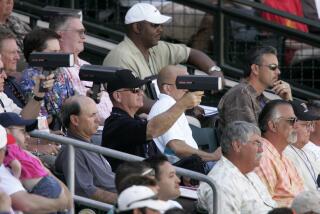Scouting Dispute ‘Silliness’ : Justice Is Incredulous of Battle Over Twins’ Stand on Religion
- Share via
SANTA ANA — An appellate court justice on Tuesday denounced as “silliness” a legal dispute involving Anaheim Hills twins who refuse to take an oath to God as required by the Orange County Boy Scouts.
Attorneys on both sides of the controversy surrounding Scouts William and Michael Randall, now 12, say the case involves constitutional issues of freedom of speech, association and religion that are at the heart of Scouting.
But during oral arguments Tuesday before the 4th District Court of Appeal in Santa Ana, Justice Thomas F. Crosby Jr. sounded incredulous.
“I can’t understand the Scouts,” Crosby said. “I can see fighting this battle on the battlefield of permitting girls, or fighting it on the battlefield of allowing homosexual troop leaders. But fighting it on the battlefield of what children at the Cub Scout level think about religions . . . seems to me to be absolute silliness.”
The boys, who came to court Tuesday in matching “Tasmanian devil” neckties, sued the Boy Scouts in 1991, after they were kicked out of the Cub Scouts for refusing to swear an oath to God.
After a 1992 trial, Orange County Superior Court Judge Richard O. Frazee Sr. issued an unprecedented decision barring the Boy Scouts from discriminating against the Randalls because of their religious beliefs--or lack of them. Tuesday’s arguments came during the Scouting organization’s appeal of that decision, which marked the first major defeat to national membership policies.
Justices are expected to issue a ruling within 90 days.
While the case has been making its way through the courts, the Randall twins have been allowed to trade their Cub Scout uniforms for Boy Scout duds.
The sixth-graders said Tuesday that they simply want to remain silent during the troop pledge to God. They object to the oath because they said they are still exploring their beliefs about religion and do not want to take an oath they do not understand.
“I’ve been to a lot of different churches, synagogues,” William Randall explained, adding that he and his brother have been encouraged in this by their parents. (Their father is an attorney representing them in the dispute.) “I just hope I can stay in the Boy Scouts,” William said.
The dispute has resurfaced as long-held Scouting traditions are coming under attack from several sides--lawsuits have been filed nationwide challenging policies that bar women and homosexuals in leadership positions, and girls and atheists as members.
*
In November, 1992, several conservative Orange County politicians, including members of the congressional delegation, sought a boycott of companies that had stopped contributing to Scouting because of policies regarding homosexuals and atheists. The next month, the Boy Scouts Council of Orange County issued a public appeal for financial support to continue the legal fight in the Randall case.
The Randall twins have paid a price for their beliefs. The boys said they have weathered gripes from fellow Scouts and stares from strangers. Their father, James G. Randall, said the family has received death threats and obscene letters.
Away from court, William and Michael said, they like to play Nintendo and baseball, listen to CDs and follow the Mighty Ducks hockey team. They both want to be astronauts when the grow up--and maybe even Boy Scout leaders.
Along with their ties dancing with Warner Bros. cartoon characters, the boys were dressed in nearly identical dark pants and green shirts, listening intently as their father argued in the latest legal round.
A key legal issue is whether the Boy Scouts are a business--as the lower court held--that must abide by state anti-discrimination guidelines.
James G. Randall contends that the local Boy Scouts are a business with millions of dollars in operating budgets and assets, and shops and campsites on state, federal and local land.
*
Attorney George A. Davidson, who represents the Boy Scouts, said they are a private organization that has the ability to set membership guidelines.
“One has to accept duty to God” above all else to be a Boy Scout, Davidson said outside court, adding that allowing the Randalls to disavow that requirement would send mixed messages to other Scouts.
“If they say something else, it means duty to God takes second place,” he said.
Justice Sheila Prell Sonenshine asked Davidson whether the oath could be altered to let Scouts recognize a duty to do good. Sonenshine also asked whether Randall would agree that girls should be members.
When Randall speculated that there might be exceptions for single-sex organizations, Sonenshine observed: “You’re hot on the path of one area of discrimination because it’s dear to your heart, but you’re willing to concede that there may be exceptions to other areas of discrimination, because those areas are not dear to your heart.”
More to Read
Sign up for Essential California
The most important California stories and recommendations in your inbox every morning.
You may occasionally receive promotional content from the Los Angeles Times.














